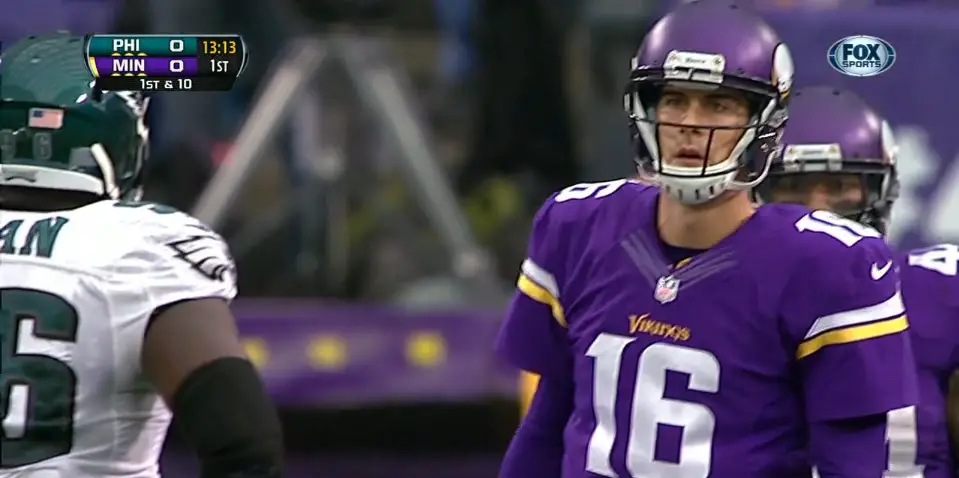The Minnesota Vikings were desperate Sunday in the MetroDome. Not only was star running back Adrian Peterson (last year’s NFL rushing leader) out injured, so was his more-than-capable backup Toby Gerhart. Desperate people are dangerous though, and as Tommy Lawlor said, the Vikings were backed into a corner and came out swinging.
Swinging in this case meant throwing the ball. Matt Cassell had a flashback to his best days with New England in 2008 and Kansas City in 2010, slinging it for 382 yards and two touchdowns (helped by a lot of missed tackles, courtesy of nearly every Eagles defender). The Vikings did run, flinging Matt Ariata into the Eagles’ tough defensive line 30 times for only 51 yards, though he did punch in 3 touchdowns from short distance. But it was the relentless aerial attack that destroyed Philadelphia.
The injuries forced Minnesota to accidentally sidestep the strength of the Birds’ defense and test its weakest point — the secondary. On top of that, a series of injuries crippled even such pass defense as Philadelphia can usually muster. Earl Wolff was still out with his hyper-extended knee and Patrick Chung’s play in his absence seems to worsen every week. Then, mid-game, Brandon Boykin was knocked out with a concussion. Kurt Coleman replaced Chung for performance reasons, then he was injured out. Colt Anderson, who normally sticks to special teams, attempted to fill the gap, and then HE was injured too. Chung came back in because there was literally not another player who could, except possibly Jeff Maehl who played some DB in high school.
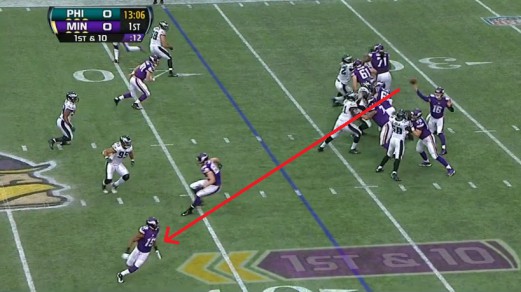
You can see where this is going.
After the game, the Eagles brought safety Keelan Johnson up from the practice squad onto the active roster. Johnson is an undrafted rookie from Arizona State who didn’t survive the Dolphins’ training camp. He has promise as a muscular 5-foot-11, 209 pound safety who had five interceptions last year as a senior and was second on the team with 88 tackles. Just as importantly, he’s been practicing with the team all year and should have an idea what’s expected of him. Philadelphia is unusual in that Coach Kelly has the practice squad travel with the team and work out before games, and hopefully this extra work will pay off. The Eagles sure need help.
Keelan should play mostly special teams, assuming that Earl Wolff is back and Nate Allen stays healthy. As I write this, on Thursday before the Chicago game, both Coleman and Colt Anderson — ST stalwarts — missed practice due to injuries. But in a pinch, Johnson might be a better option at safety than Chung at this point.
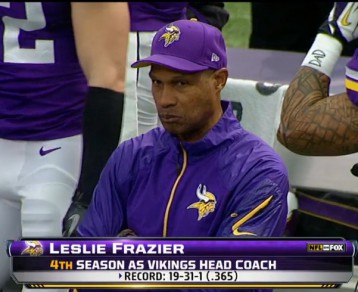
Minnesota Coach Leslie Frazier celebrates
This is a Philadelphia team that hadn’t given up more than 21 points since September — a stretch of 9 games. Only twice all year has anyone scored 30 points or more on the Birds — San Diego with 33 in week 2, and Denver’s 52 in week 4. No one could have predicted that the Eagles would lose a shootout to the AP-less Vikings, but that is exactly what happened. Minnesota dropped 48 points on the Birds’ heads, and they came back with only 30.
All year, the Eagles have been terrible on 3rd and long. It’s painful to watch, especially since you know what’s coming. Strangely, their gritty run defense makes 3rd and short a lot harder to convert against the Eagles than longer distances. On 3rd and 2, the Birds allow first downs only 38.9% of the time. But with 4-8 yards to go on third, opponents convert more than half of the time. Even on 3rd and 11 to 15 yards, which should be desperation time for an offense, the Eagles are allowing drives to continue nearly a quarter of the time.
The obvious strategy then, is that the Birds should give up more yardage on second down. Gift opponents all territory up to 2 yards short of the sticks, then slam the door shut. Sacks should be saved for third and fourth down exclusively.
Sadly, the coaching staff has not recognized the genius of this concept, but the Vikings saw the other obvious conclusion: to beat Philadelphia, just run your third and long desperation play every down, mixed with occasional doomed runs up the middle to keep the Eagles off kilter, and reel in touchdown after touchdown. It worked.
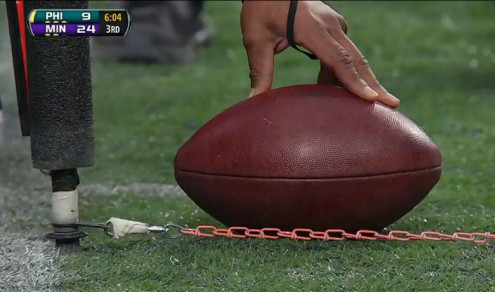
The result of fourth and one. It was that kind of a day.
Chip Kelly had a rough game, looking like a rookie in this league with a number of strategies that were second guessed by every writer in town (including me). The most stunning play was going for it on fourth-and-one-half-yard to go, at the Eagles own 24. The run got stuffed, but I have no problem with the call. The Eagles had trailed all game and been unable to stop the Vikings from any starting position on the field (including the 9-yard line). As Kelly said, you should always be able to get a half yard, and if you can’t, punting isn’t going to turn the game around for you.
The more questionable calls were passing almost every down, and kicking off short to avoid returner Cordarrelle Patterson. Both strategies made good sense as opening gambits, but Kelly stuck to them stubbornly even as they failed. The little pooch kickoffs worked pretty well, with Minnesota starting on their 25, but the line drives and squibs yielded field position that was barely past midfield. And despite all that, Patterson still hurt Philadelphia with five receptions and two runs for a total of 50 yards from scrimmage.
On the pass/run ratio, it’s true that Minnesota is very bad in passing defense and was stacking the box relentlessly, but there are ways to coach around anything. Kelly’s pass-first and pass-last response was so one-sided and predictable that it was easy to scheme against, and Foles had an off night with several bad throws and several worse drop-back decisions, mostly hanging on to the ball too long until sacked. It is true that DeSean Jackson had a great game with 195 yards receiving and a touchdown. Zach Ertz had a beautiful one-handed catch, and Jason Avant finally had a decent game. But for most of the game, it felt like Leslie Frazier was expertly dangling the prospect of big passing yards in front of Chip and suckering him out of his preferred game.
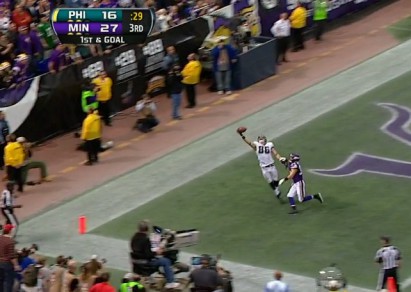
Zach Ertz actually caught this ball, one handed of course
Shady only had eight carries for 38 yards, and NICK FOLES got more yards (with 41 on five runs), though McCoy picked up another 68 yards on five pass receptions. McCoy needs more than eight carries to keep a defense honest, and Foles’ strong early running could have helped the team later in the game as well. Yes, I said it — Foles’ strong running. He had almost as many yards per carry running (8.2) as he did passing (8.9).
There were other lessons to be learned. The Eagles need to figure out how to play better from behind, and several Eagles had a bad game and did not execute well — though Foles had the worst (including his second interception). Luckily, Dallas choked, predictably, and left the Birds with a one-game lead for first place in the division (the already slim hope of a wildcard berth has now been mathematically eliminated).
None of this is a disaster. The Eagles still lead the division and might clinch it even before their week 17 showdown against Dallas. There was a distinct bit of mania in Eagles’ fans and writers right before this game, after five straight victories, with open talk of winning out and even the Super Bowl, and this setback clearly adjusted some attitudes. Cary Williams said out loud that he was glad his team lost, so they could get knocked off their high horse. I can’t go that far, but a clearly chastened team, with Earl Wolff back at safety, should be in good shape to outscore Chicago Sunday night.
Top Photo From Video
Related Articles:
Chip Kelly Update: Everything's Good Again ...
Chip Kelly Update: Wailing and Gnashing of Teeth
Shock and Awe -- The Oregon Ducks' Football Hangover Effect
Despite Lopsided Score, Georgia State "Never Stopped Believing"
Hope Springs Eternal for Ducks
Incompetent Pac-12 Officials: How Do You Miss ALL of THIS?
Mark Saltveit’s newest book is “Controlled Chaos: Chip Kelly’s Football Revolution” (Diversion Books, NY) has been recently released. He is the author of “The Tao of Chip Kelly” (2013) and writes on science, religion, wordplay and political scandals. He is also a standup comedian and the world palindrome champion.

